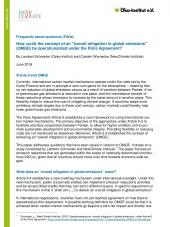Article 6 of the Paris Agreement establishes a framework for international cooperation that enables countries to engage in international carbon market mechanisms. Article 6.4 establishes a new crediting mechanism with international oversight. A key requirement of this new mechanism is that it “shall aim to (…) deliver an overall mitigation in global emissions” (Article 6.4(d)). In the ongoing negotiations on the international rules governing the Paris Agreement, countries have different views on what exactly this requirement means and how it should be operationalised and implemented. This report identifies and discusses key options for operationalising this concept.
This report was jointly prepared by Lambert Schneider and NewClimate Institute to provide technical support to Saint Lucia in the context of the international negotiations under the Paris Agreement.
Key conclusions:
Several criteria need to be fulfilled to achieve overall mitigation. First, the portion of emission reductions used for overall mitigation must be quantified. Second, accounting provisions must ensure that this portion is not used by any country towards achieving their NDCs. And third, to ensure that overall mitigation is achieved, the approach for implementing overall mitigation must be mandatory and not an option for Parties.
Several of the options in the current negation text do not meet these criteria and are not able to achieve overall mitigation. Some options do not meet any of the three criteria, other options - such as 'conservative baselines' and 'limiting the crediting period' - do not ensure that the non-credited emission reductions cannot be used towards the achievement of a Party’s NDC. Only the options ‘automatic cancellation’ and ‘discounting’ fulfil all three criteria and thus ensure that overall mitigation is achieved. It is recommended to policy-makers to pursue 'automatic cancellation'. For this option it is easier to ensure that the required cancellation actually occurs, as it can be conducted by the supervising body of the mechanism and a precedent for this implementation approach exists from the CDM.
An important outstanding decision for policy-makers is the share of units that should be cancelled for the purpose of achieving overall mitigating. Some stakeholders fear that a higher share would lead to market distortions, fewer projects being implemented, and higher costs for buyers. In this report market implications are assessed for 18 different scenarios, using a simplified model with representations of hypothetical supply and demand curves and different rates for overall mitigation. Results show that the concept of overall mitigation has, for a broad range of possible circumstances, various benefits although the costs for supplying credits increase.
Overall, our analysis suggests that implementing overall mitigation can be straightforward – provided that the political will is given to implement this principle. Cancelling a portion of units after issuance and ensuring that overall mitigation is achieved through appropriate accounting provisions is relatively simple. At the same time, benefits for transferring countries, with only moderate increases in costs for buyers, can be achieved for a broad range of rates for overall mitigation.





